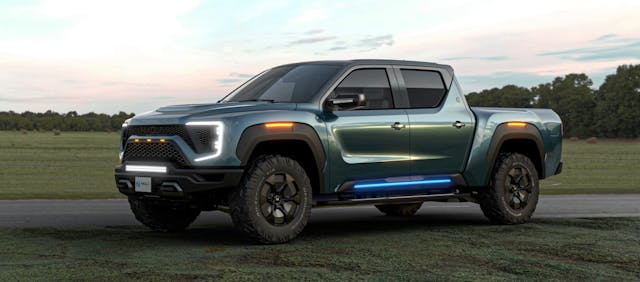GM renegotiates Nikola deal, erases equity stake and EV pickup production plans
General Motors is backing down from its blockbuster deal with EV startup Nikola. The $2 billion equity-stake deal announced in September, which would give Nikola access to GM’s manufacturing, Ultium battery, and Hydrotec technologies, will be significantly scaled back following renegotiations. Under the new terms of a non-binding agreement, GM’s previous 11-percent stake and role in producing Nikola’s EV pickup have been scrapped.
The last time we heard about General Motors and its hydrogen-centric deal with Nikola, Trevor Milton was still the CEO of the startup. That was back in early September, when Nikola was relishing the announcement of a massive, $2 billion GM equity-stake investment made in order to begin development on light- and heavy-duty hydrogen fuel-cell trucks. Two months later, Milton is essentially in hiding after being catapulted from his seat at the company like a chunked pumkin. The disgraced executive has deleted his public accounts from nearly every social media platform he from which he once belched empty promises. All this was damage control, following the report by Hindenburg Research that eviscerated the company’s reputation with a series of fraud allegations.
Those claims were jarring, noting that Milton allegedly lied to investors on numerous occasions. One, in particular, was almost poetic: Despite its many claims that the Nikola One semi-truck concept was “not a pusher,” Nikola’s show truck wasn’t actually moving under its own power in marketing and public appearances. In fact, the concept was powered by natural gas rather than a hydrogen fuel cell. All this while the supposedly hydrogen-powered truck wore a livery that celebrated the roots of its technology. Predictably, this revelation tanked Nikola stock even though the company attempted to refute the claims officially, and Milton’s ham-fisted responses on social media not only failed to impress investors, but they caught the attention of the Securities and Exchanges Commission. The Department of Justice, too.
Since then, one of GM’s ol’ faithfuls, Mark Russell, arrived at Nikola’s CEO helm. Certainly he played a role in renegotiating the terms of a new memorandum of understanding (MOU) between the two companies, which establishes the foundation of their future development partnership. The new agreement, co-announced by both companies this morning, scales back the prior $2 billion equity investment into essentially a vendor relationship, with GM supplying Hydrotec fuel-cell fuel solutions for Nikola’s concept Class-7/8 semi-trucks. The revised deal dumps cold water on any any notion that GM would provide the necessary platform for and assist in development with Nikola’s Badger concept pickup truck.

“This supply agreement recognizes our leading fuel cell technology expertise and development,” said GM’s executive vice president of Global Product Development, Purchasing and Supply Chain, Doug Parks. “Providing our Hydrotec fuel cell systems to the heavy-duty class of commercial vehicles is an important part of our growth strategy and reinforces our commitment toward an all-electric, zero-emissions future.”
“Heavy trucks remain our core business and we are 100% focused on hitting our development milestones to bring clean hydrogen and battery-electric commercial trucks to market,” said Nikola’s Russell. “We believe fuel-cells will become increasingly important to the semi-truck market, as they are more efficient than gas or diesel and are lightweight compared to batteries for long hauls. By working with GM, we are reinforcing our companies’ shared commitment to a zero-emission future.”

If not for Milton’s questionable background, allegedly dishonest practices, and haphazard damage control, Nikola may have been able to salvage the original deal. As things have unraveled, all the weight is on the startup’s troubled semi-truck project, which is essential for the company to remain viable and become trusted down the road. Players in the heavy trucking industry do not contract their chassis lightly. Fleet-sale deals are typically made in bulk with the assumption that repair support and parts will be at the ready, and that the partnership will have long-term viability. In addition, fleet buyers benefit from a number of discounts from OEM suppliers amid the purchase of both vehicles and any accompanying parts or upgrades. Nikola may end up with a legitimate hydrogen fuel-cell big-rig in due time, but without an established fleet program willing to buy in, finding sustainable cashflow through sales remains a critical obstacle. At least with Milton set aside and a new MOU, Nikola has a chance to get back on firm footing.


